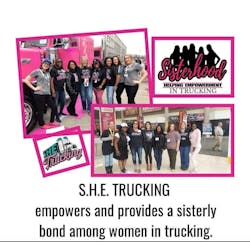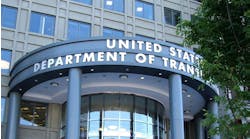Driving long-haul for nearly 40 years, Virginia Clark has seen and experienced it all. And she believes this is the best time for women to join the trucking industry.
Although Clark has always loved and been fascinated with the industry, trucking hasn’t always been kind to her. She started her career as a nonunion driver in the 1980s with no formal CDL training. As one of very few female truck drivers at the start of her career, Clark experienced physical violence, mental abuse, and made just half the salary—8 cents a mile versus 16 cents a mile—of her male counterparts.
But the industry has changed—and continues to change—for the better, Clark emphasized.
See also: Does trucking have a training problem?
“When I was first hired, there weren’t many women; we weren’t widely accepted in the industry,” Clark said during an April 28 joint virtual roundtable by the U.S. Departments of Labor and Transportation, where industry stakeholders gathered to raise awareness of sexual assault and harassment in trucking.
Today, Clark drives for UPS and is a Teamsters Local 710 union member. She’s also a strong advocate for recruiting more professional female drivers into trucking’s ranks.
“I tell everybody that they need to do it,” she emphasized. “The money is great, the benefits are excellent, and as far as safety goes, it’s a lot safer now than it was even 25 years ago.”
The April 28 roundtable was part of the Biden administration’s call for a National Day of Action to raise awareness and advocate for the prevention of sexual assault and sexual harassment in trucking. This event also aligns with the administration’s Trucking Action Plan, which aims to improve training and safety standards to recruit, train, and retain drivers from underrepresented communities.
Included in the Trucking Action Plan is a Women of Trucking Advisory Board, which has been established by the Federal Motor Carrier Safety Administration to work with drivers and trucking organizations to help eliminate barriers that keep women from entering and staying in the trucking profession.
See also: Driver apprenticeships prove effective, but …
“For too long, widespread—and often unchecked—incidents of sexual assault, violence, and harassment in the trucking industry have damaged lives, destroyed careers, and steered women away from pursuing trucking jobs,” said event moderator and Women’s Bureau Director Wendy Chun-Hoon. “The Day of Action is an important step toward bringing industry stakeholders together to denounce sexual violence and harassment, effect meaningful change and, we hope, to inspire similar actions in other historically male-dominated occupations and industries.”
Fellow panelist Sharae Moore, founder of nonprofit S.H.E. Trucking, has been driving for eight years. Born and raised in Chattanooga, Tennessee, when Moore was growing up, she always wanted to see “what was on the other side of Lookout Mountain.”
“Trucking provided me that opportunity, and I love the trucking industry,” Moore said. “My dad is a truck driver; my mom was a bus driver. Once I got into trucking, it felt like freedom. That’s what I loved the most.”
Out on the road, however, Moore quickly recognized there was little to no representation for women in the industry.
She originally started S.H.E. Trucking as a clothing brand, designing T-shirts for lady truckers. The organization has since grown to help more than 30,000 women and minorities in the trucking industry establish and maintain professional careers.“This roundtable discussion is the first step, but we have more work to do,” Moore urged. “We ask that the trucking companies listen and incorporate a zero-tolerance program and sexual harassment policies into their companies to increase the ratio of women in the trucking industry and to successfully onboard and retain more women drivers.”
How trucking companies can prevent harassment
When it comes to preventing harassment and discrimination in the workplace, training and outreach is the best place to start, noted Andrea Baran, regional attorney for the U.S. Equal Employment Opportunity Commission.
Baran pointed to three EEOC recommendations that are particularly well-suited to the trucking industry.
“One of the most important things any business can do is to make sure that employees hear from top company officials frequently that no form of harassment or discrimination will be tolerated,” she said. “A really highly effective way to do this is with a video statement from the company’s CEO, president, or high-ranking official that clearly sends the message that this is important to the company. It’s something that can be done repeatedly and be sent out as a link to workers that they can watch wherever they are.”
Second, according to Baran, is implementing effective training that is available wherever workers are.
See also: Fleets find success building driver-centric culture
Finally, it’s important that employers go beyond just prohibiting illegal behavior, she added.
“By the time you get to illegal behavior, you’ve already sort of lost the war,” Baran explained. “It’s more important that employers encourage respect and civility in the workplace. Make it clear that any unwelcome or offensive behavior won’t be tolerated.”
Shelby Schacher, driver acquisition specialist and recruiter with Grand Island Express (GIE), indicated that the carrier has implemented and abides by its zero-tolerance policy.
“It is important that new and current drivers understand our stance on sexual harassment and abuse; we speak about our stance on the matter Day One of orientation,” Schacher said. “At that time, we outline the specific details of our anti-sexual harassment policy and educate them on how to alert the proper channels when an incident occurs.”
She also noted that it is GIE’s obligation to provide resources if an incident does occur. A big piece of the company’s operating model is its training program.
“We feel strongly that we would never want to make a trainer or student feel uncomfortable,” Schacher said. “Our goal is to ensure trainers and students are comfortable with the person they are paired with.”
Check out this downloadable PDF for GIE’s zero-tolerance policy, as well as other policies from fleets, trucking associations, and various industry organizations.
“Sexual harassment and sexual assault don’t happen in a vacuum,” explained Robin Runge, who serves as a board member of the D.C. Coalition Against Domestic Violence. “They often happen in places where we see racial harassment, harassment based on national origin, and harassment based on disability. We recognize that individuals have several identities. Really having strong policies and procedures in place to address all of them collectively, not individually is really powerful.”
Listen to the workers, Runge advised. She added that they truly know better than anyone about what it means to be safe and comfortable in the workplace.





